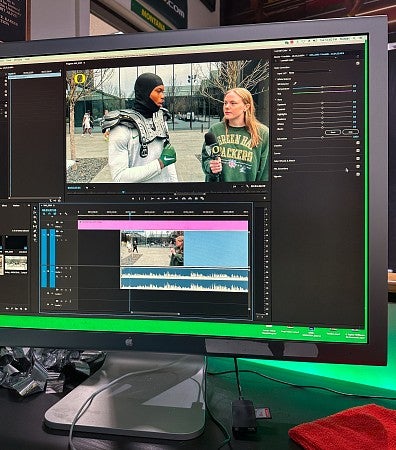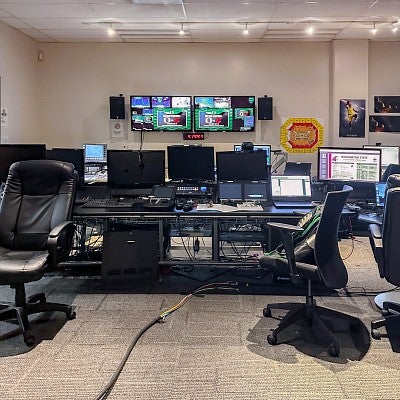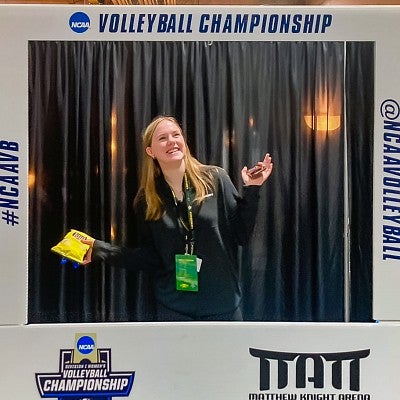
As a household name in college sports, UO Athletics offers valuable internship experiences to students who are interested in both sports and communications. Since I landed an internship as a sophomore this year with GoDucks — the name of the UO Athletics website — I have discovered the program offers multiple roles to students and is a great way to grow your skills in sports communication while adding valuable experiences to your resume.
Board shows, livestreams and broadcasts — oh, my!
One of the greatest things about my UO GoDucks internship is that I get to do communications work at a wide range of sporting events. As a GoDucks communication intern, you might hold the microphone and run the camera for athletes after practices or games, or direct “Duck Insider,” a daily podcast hosted by Joey McMurry, Oregon Sports Network director of broadcast and executive director. (McMurry also oversees the UO School of Journalism and Communication’s [SOJC] Duck TV program.)
The most popular events to work are the board shows, livestreams and broadcasts. Board shows are the Jumbotron videos that play in Matthew Knight Arena (MKA), while livestreams and broadcasts refer to how the event is streamed — online or on television. All the events have a board show, and the more popular games are livestreamed or picked up by the PAC-12 Network (soon to be the Big Ten Network for UO games), which have much bigger crews.
What you’ll do in a GoDucks sports communication internship
As an intern, you could work a wide range of events, direct McMurry’s daily podcast, help out with broadcasting games or assist at media availabilities.
Media availabilities happen a few times a week for the football, baseball, men’s and women’s basketball, and volleyball programs. After practices, athletes and coaches come out for interview with the news about their upcoming games. Interns get to film and hold the microphone for the athletes. Then they quickly edit the interview clips, select the best quotes for the videos and upload them to the GoDucks YouTube channel.
During games, there is a range of jobs interns can do, including camera work, crossfire, technical directing, graphics and replay.

Three or four cameras are likely to be in operation around MKA during a regular game, all capturing different angles. Interns who work crossfire, technical directing and replay all work together in the basement of MKA to create a successful show. Usually at least eight interns work alongside professional network staff to make the whole operation run smoothly, and the Pac-12 games have even more staff doing even more jobs.
Here's what the GoDucks interns do during games:
- Graphics interns upload graphics, such as points and stats for each player, to the board and broadcasts during the game.
- Replay interns go through the live feed and record the best plays of the game. The director posts those replay shots on the Jumbotron and uses them in the highlight reel at the end of the game.
- Crossfire interns work with the show runner to display ads and crowd-interactive graphics on the Jumbotron. They then work with technical directing to display them.
- Technical directing interns cut camera angles according to the director’s calls. This involves cutting during plays, displaying ads and timing up replays.
How to apply for a GoDucks internship
I first found out about the application for the internship at the Warsaw Sports Business job fair in April. I grabbed the application link and filled it out online. I later also found the application on Handshake and through the SOJC Student Success Center’s weekly newsletter. Most internships open in April and May during spring term, so UO students should check Handshake and go to job fairs in the spring so you don’t miss out on them.
My best advice for applying is to be honest about your skills. On my application, I wrote that I was not super confident in crossfire, audio, replay and technical directing when I applied, but I told them I’m a quick learner. They aren’t looking for someone to be the best at those jobs right out of the gate, but rather for students who are eager to learn and who have some experience in similar areas, like camera work. It’s a competitive internship, but you can stand out if you are confident in some of the related skills.
A GoDucks internship will teach you a lot, but if you want to hit the ground running, it’s important to have some prior experience. I recommend completing the SOJC’s Gateway to Media course before applying. That course helped me gain confidence and build the skills I needed to quickly edit videos and audio, shoot media and work with audio, which I did every day in my internship.
That said, my best advice for anyone who is afraid to apply is to take the risk. When I applied for this internship, I was experienced in only a few areas. As I’ve worked more in this role, I’ve become more comfortable in jobs I did not think I would qualify for because I lacked some experience.

What I have learned
The internship has given me experience in roles I could not do in a classroom setting, like using the cameras and editing equipment in real time during games and media availabilities. My skills in camera work and Adobe Premiere Pro video editing have grown so much during this internship. I learned how to technical-direct the board shows in Matthew Knight Arena, a job I never knew I could do before this internship.
The professional crew members who work each event are so helpful, quick to answer questions and teach you what you need to know. They’ve helped me learn that it’s OK to make a mistake if you fix it quickly and move on. They are eager to help you learn and will assign you to event crews if you show up often and remain attentive. In this internship, you get what you put in, and they make that clear when you’re working.
The first day I worked, they threw me into camera work for a women’s soccer game. It was my job to follow the ball with the camera and make sure the audience could always see it. My camera was the main camera in the game, so it was a lot of pressure. It was a terrifying experience, but I got it down quickly. I made some camera errors, but by the end of the 90-minute game, I felt a lot more confident. After that game, each event or media availability I worked on gave me more confidence in my skills.
The athletics events take long hours, but it is rewarding to see the payoff after the games and to know I played a part in making the livestream or board show run smoothly.
—By Sophie Fowler, class of ’26
Sophie Fowler, class of ’26, is an advertising major with a minor in multimedia. You can connect with her on LinkedIn.
